Forum Replies Created
-
AuthorPosts
-
Robert GreggParticipantAh yes,
Air could be involved, and as such you should work to rule that out.
The only time I like using air on soft tissue is in the opposite direction of the fiber orientation–that is, not coaxial to the direction of the cut, but accross from it or lateral to it so as not to force air into the opening wound.
Air is useful for cooling the soft tissue and therefore useful in non-anesthetic techniques. However, the converse is true–air is not needed when one gives local anesthesia, hence the reason us old laser users don’t fuss with the “no shot” stuff……..we numb em up, and zip it quick and fast–minimal post op fuss.
Good luck with your patient and let us know how it goes–your experience may serve to save others from repeating the scenario.
Thanks for posting your concerns.
Bob
whitertthSpectatorpatient came in today with swelling,and pain in max canine …anaesthetized tooth with waterlase using Bill Chen’s (turtle) technique, Tooth was non vital but painful to percussion… accessed using a t-4 tip ..instrumented to a 20 file then used 2, 3 , and 4 hundred micron fiber with waterlase….tooth was 28 mm long..went back with 25 file and it slid smoothely in and out. Used a 1 and 2 peeso then back with 300 micron fiber and filled…no anaesthetic, no pain and patient was thrilled. what would u do differently?
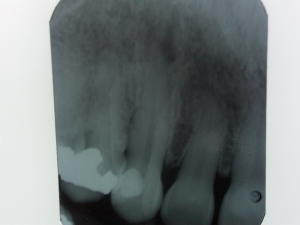
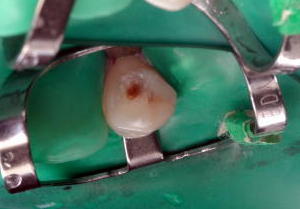
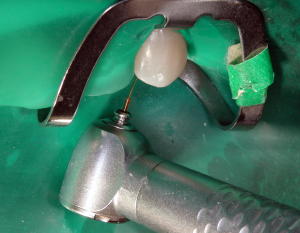

PatricioSpectatorRon,
Great step forward. I have dabbled with the endo stuff but have not followed through to completion. Today I did open a hot molar which the patient found painful to the presssure of his tongue without any problems. I used no anesthetic. This was a step forward for me.
I keep thinking, boy am I having fun. Thanks for the pictures.Pat
whitertthSpectatorsorry some are reversed..i was kinda excited to post them and didnt check to seeif i had them all the same way
2thlaserSpectatorNot much Ron, as far as doing something differently. We each have our own way of adding the laser to our tx. Your way seemed to work great. Sometimes I use the Waterlase for complete enlargement, sometimes I don’t, it just is so case selective, like anything else with the laser. Good job, well done!
Mark
2thlaserSpectatorHere is a case that came in today. Notice the Erosive Lichen Planus throughout. This patient has a fairly unremarkable medical history, has seen everyone, the periodontist, the dermatologist, the internist, now me. She is rinsing with Peridex, and has some topical ointments prescribed to her by the physician. The biopsies were conclusive by the periodontist of Erosive Lichen Planus. How can the, a, laser help, can it help, this patient. How would you start? I have idea’s, but am looking to you experts here, Bob, Del, Glenn, Ron’s, Pat, Al…others, to give advise, even though you haven’t seen the case, or history. Very interesting case. She is a RN.
Mark
2thlaserSpectatorOk, I will reply to my own stupid mistake!!! (I am cracking up on how stupid I am), Here are the pictures.
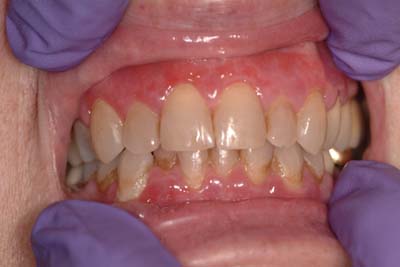
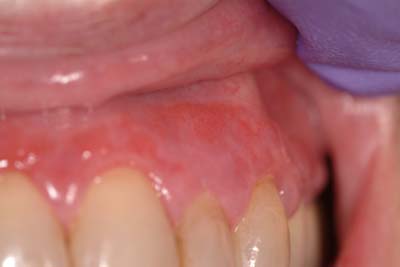
Ok, now let’s move forward, geez!!!
Mark
Alfred WyattSpectatorMark,
I treated a case very similar to this a few months ago and there was also a clinical presentation at the ALD on erosive lichen planus.The recommendation is to start with a small less conspicuous area preferably with an erbium laser. ( I used the hoyaC.B.@10Hz/30mJ which is also the setting used for apthous ulcers) The lecturer (I’m sorry I can’t remember his name right now) says thatthis is important to start small and shallow because this lesion can actually become more prevalent if treated too aggressively. The erbium is the best laser in this situation because it penetrates mch less than the other wavelengths. Give it a shot with a small area and take it slow.
Alfred Wyatt
2thlaserSpectatorAlfred,
I really appreciate your response. That is the exact route I was planning. I will keep all in touch as this progresses. Any more advice from others?
Thanks,
Mark
whitertthSpectatorIn a recent conversation with Bill Chen , he actually suggested that I instrument the canal to 25 file first then use the endo fibers to complete…I just extrapolated on what he suggested
PatricioSpectatorMark and Alfred,
I have been looking at two cases and wondering whether to try a course of treatment so I will be very interested in your results. This would be a great service fe can successfully treat this problem.
Pat
PatricioSpectatorHi guys and gals,
Same tips for me but I regret that I am not switching tips like you pros as often as I should. I tend to use the g6 . I did get two Biolase tip blocks so will begin to do better.
I anesthetized and repreped #8 after removing an old crown. I used the waterlaser to trough and while I did pack some cord on the facial it sure is a lot easer with the laser to expose the margins without fusing with packing cord. It makes for an easier day. I feel like I am in a journeyman stage. Not doing anything spectacular but learning with each patient and becoming friends with that thing.
Pat
Andrew SatlinSpectatorMark,
I have also struggled with a handful of these cases over the years. Please keep us posted. I am very interested in following your treatment/results over time.
Thanks!
Andy
2thlaserSpectatorHey guys, thanks for the input, and I WILL keep you all in touch as it goes, WITH documentation. Any suggestions are welcome.
Sincerley,
Mark
whitertthSpectatorI think i would try a small test area first..low wattage maybe .75 with a little air and water(14/8)…I would normally coat at the end with no water and air to apply a “laser band aid” but I think i would hesitate here doing that as the tissue is very sensitive and I wouldnt want to over dry the area…I would be careful next to any gingival margins as this tissue is very sensitive and u may get a recession type response if u were too aggressive.. only my 2 cents….. let me know
p.s. it was a pleasure talking to u today -
AuthorPosts
